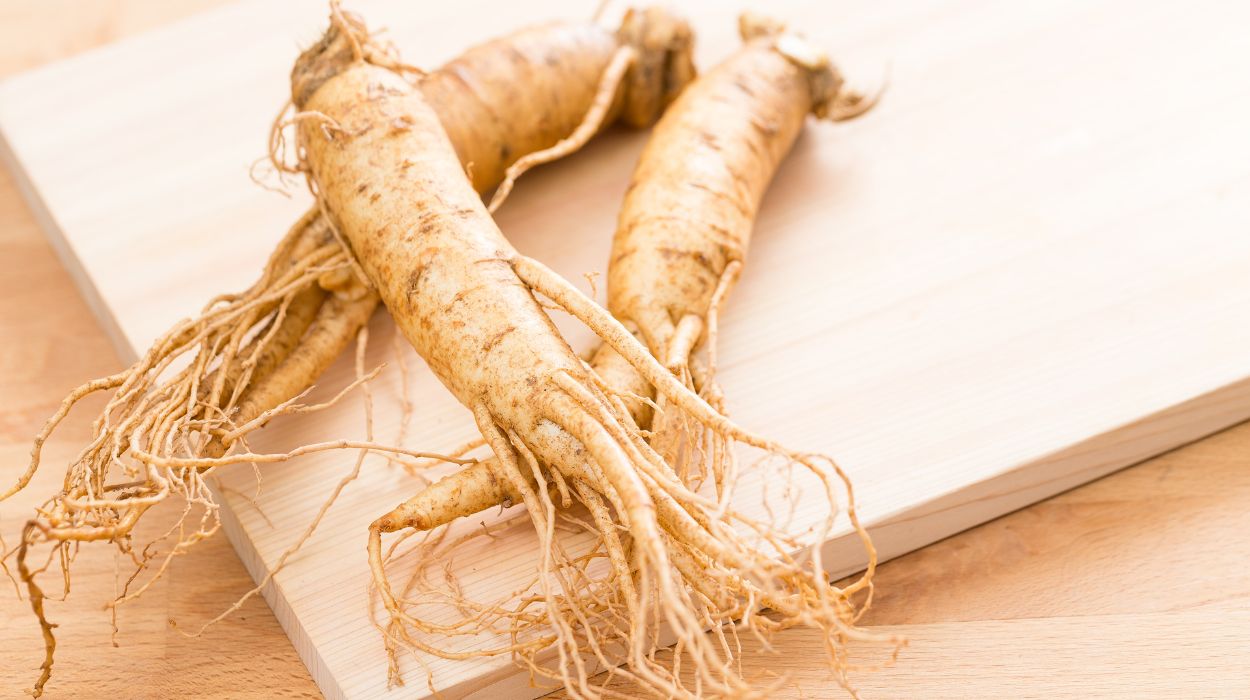 Evidence Based
Evidence Based
Evidence Based
This article is objectively based on relevant scientific literature, written by experienced medical writers, and fact-checked by a team of degreed medical experts.
Our team of registered dietitian nutritionists and licensed medical professionals seek to remain objective and unbiased while preserving the integrity of any scientific debate.
The articles contain evidence-based references from approved scientific sites. The numbers* in parentheses (*1,2,3) will take you to clickable links to our reputable sources.
6 Benefits Of Ginseng (Science-backed Research) In 2024

For more than 2,000 years, the ginseng group has been employed in traditional Chinese medicine. Ginseng has a variety of benefits including anti-inflammatory, stimulatory, antioxidant and anti-apoptotic. Apoptosis is the programmed death of cells. Korean ginseng has long been known to have anti-cancer activity[1] through its apoptosis action.
Ginseng can reduce cognitive decline in the elderly as well as the potential of developing dementia-like illnesses. Korean red ginseng has a higher anti-fatigue factor than white ginseng.
Fresh ginseng is gathered before the age of four, while white ginseng is harvested between four and six years. Red ginseng is not harvested until after the age of six years. Ginseng is classified as white or red depending on processing methods.
Ginseng is a common ingredient in supplements and natural medicines, and there are several different species of this perennial plant. The most common types, Asian ginseng, and American ginseng are among the 13 species classified as Panax ginseng.
The concentration of active components in American and Asian ginseng differs in the way it affects the body. American ginseng is thought to have a calming effect, while Asian ginseng has an energizing impact. Korean and Asian ginseng are used interchangeably.
Ginseng’s primary active components are ginsenosides. It is suggested that each ginsenoside has a tissue-specific effect.
Health Benefits Of Ginseng
Asian ginseng, also known as Panax ginseng, has long been celebrated for its myriad health benefits. This revered herb, deeply rooted in traditional Chinese medicine, offers a wealth of advantages for those seeking to enhance their overall well-being.
- Blood sugar regulation
- Reduce inflammation
- Increase energy levels
- Brain health and function
- Against cancer
- Boost immune system
Benefits Of Ginseng

What else can Asian or Korean ginseng do for you? Here are six evidence-based benefits of this plant.
Blood Sugar Regulation
Ginseng appears to help persons with and without diabetes control their blood glucose levels.
Research demonstrates that ginseng extracts aid diabetes patients by offering antioxidant protection that reduces free radicals in their cells.
In one study[2], 19 persons with type 2 diabetes were given 6 grams of American ginseng along with their usual anti-diabetic medicine or diet.
They maintained reasonable blood sugar control throughout the 12-week research, which was surprising to researchers. The participants also exhibited an 11% reduction in blood sugar levels, a 38% reduction in fasting insulin. Participants also had a 33% increase in insulin sensitivity.
After a sweet drink test, another study[3] found that American ginseng helped improve blood sugar levels in ten healthy participants.
An additional study[4] found that consuming 2.7 grams of fermented red ginseng daily was more effective than taking placebo at decreasing blood sugar and boosting insulin levels following a test meal.
Reduce Inflammation
Ginseng has[5] anti-inflammatory properties as well as antioxidant effects.
Ginseng extracts and ginsenoside components have been found in test tubes to reduce inflammation and boost antioxidant capacity in cells.
For example, in one test-tube investigation[6], ginseng root extract decreased inflammation and boosted antioxidant activity in eczema skin cells.
Also, a larger trial[7] followed 71 postmenopausal women for 12 weeks while taking 3 grams of red ginseng or a placebo. Following that, antioxidant activity and oxidative stress indicators were assessed.
According to the researchers, red ginseng may help lower oxidative stress by enhancing antioxidant enzyme activity.
Increase Energy Levels
Ginseng has been demonstrated to aid in reducing weariness, the promotion of energy, and the reduction of mental fatigue.
Various animal studies have connected various ginseng components, such as polysaccharides and oligopeptides, to reduced oxidative stress and increased energy synthesis in cells, which could aid in the fight against fatigue[8].
The participants who were administered Panax ginseng had less physical and mental weariness and lower oxidative stress than those given a placebo.
In another trial, three hundred sixty-four fatigued cancer survivors were given either 2,000 mg[12] of American ginseng or a placebo. After eight weeks, those who took ginseng experienced much less weariness than those who took a placebo.
Brain Health & Function
Ginseng has been shown to help with mood, behavior, and memory. Similar to the adaptogenic herb, Ginkgo biloba, both herbs enhance memory, reduce inflammation, boost brain function, and contain a lot of antioxidants. Studies[9] have demonstrated the neuroprotective effect of the combined administration of ginkgo biloba and ginseng on brain health in animal models.
In one study[10], 30 healthy participants were given 200 mg of ginseng every day for four weeks. They improved their mental health, social functioning, and mood at the end of the trial.
However, after eight weeks, these benefits were no longer substantial, implying that the effects of ginseng may diminish with continued use.
In another study[11], 30 healthy adults were given single doses of Panax ginseng both before and after a 10-minute mental test to see how it influenced their cognitive function, mental weariness, and blood sugar levels.
The 200-mg dose was more beneficial than the 400-mg dose in decreasing cognitive impairment and weariness during the test and improving working memory.[12]
Ginseng may have aided the uptake of blood sugar by cells, resulting in improved performance and reduced mental tiredness. However, it’s unclear why the lesser dose worked better than the higher dose.
Furthermore, researchers have discovered that patients with Alzheimer’s disease had improved brain function and behavior. An improved neurochemical[13] activity profile was noted in mice with induced Alzheimer’s treated with a combination of ginseng and Ginkgo biloba.
Against Cancer
Ginseng may aid in the prevention of some malignancies.
Ginsenosides, which are found in this herb, have been demonstrated to aid in inflammation reduction and antioxidant protection. Observations [14] in various studies concur that inflammation, oxidation, and cancer are closely related.
The cell cycle is the regular process through which cells divide and expand. Ginsenosides may help break this cycle by preventing aberrant cell growth and production.
Furthermore, an observational study[15] found that those who take ginseng are less likely than those who don’t to acquire cancers such as lip, mouth, esophagus, stomach, colon, liver, and lung cancer.
Ginseng may also help individuals undergoing chemotherapy improve their health, lessen adverse effects, and boost the effectiveness of some treatment medications.
While research on the role of ginseng in cancer prevention has yielded some promising results, it is still inconclusive.
Some of the research looked at its impact on immunity focused on cancer patients undergoing surgery or chemotherapy.
One study[16] followed 39 persons recovering from stomach cancer surgery for two years, giving them 5,400 mg of ginseng daily.
Surprisingly, these people’s immune functions improved significantly, and their illnesses recurred less frequently.
Furthermore, according to a study[17], ginseng users may have a 35 percent higher likelihood of being disease-free for five years after surgery from colon cancer. They also had a 38 percent higher survival rate than non-ginseng users.
Boost Immune System
Ginseng may help to boost your immune system.
There is research to suggest that ginseng will increase the blood’s immune cells improving the body’s immune response. A study[18] of 227 people over 12 weeks showed a decrease in the number of colds in people who got ginseng.
In another similar study[19], the ginseng-taking patients caught fewer colds, and those that did catch them had less severe symptoms and were sick for a shorter duration.
Ginseng extract may even be able to improve the efficacy of vaccines[20] against diseases like influenza.
Risks, Side Effects Of Ginseng
Consumption of Asian ginseng and ginseng supplements derived from the root of the plant can lead to various risks and side effects that individuals should be mindful of. One notable concern is the potential for Asian ginseng to interfere with blood clotting mechanisms. The active compounds in ginseng root possess anticoagulant properties, which may increase the risk of bleeding, particularly in individuals with bleeding disorders or those taking blood-thinning medications. This risk underscores the importance of cautious use and consultation with a healthcare provider before incorporating ginseng supplements into one’s regimen.
In addition to blood clotting issues, gastrointestinal discomfort is another common side effect associated with the consumption of ginseng root supplements. Some individuals may experience symptoms such as nausea, diarrhea, or stomach upset, especially when consuming high doses or for an extended period. These gastrointestinal side effects can be bothersome and may warrant discontinuation of ginseng supplementation. It’s essential for users to monitor their body’s response and adjust dosage or discontinue use if adverse effects persist.
Moreover, interactions between ginseng supplements and certain medications should not be overlooked. Ginseng root can interact with various drugs, including blood pressure medications, antidepressants, and insulin, potentially altering their effectiveness or increasing the risk of side effects. Therefore, individuals taking medications should exercise caution and consult with a healthcare professional before using Asian ginseng supplements to ensure safe and effective use while minimizing the risk of adverse reactions. Overall, while ginseng root and its supplements offer potential health benefits, awareness of associated risks and prudent use are essential for promoting overall well-being.
How To Take Ginseng

When incorporating Panax ginseng into your routine, it’s essential to consider the best methods for consumption to maximize its potential benefits. Here’s how to take ginseng effectively:
- Dosage consideration: Begin with a low dosage and gradually increase as needed, as individual tolerance can vary. It’s advisable to follow the dosage recommendations provided on the product label or consult with a healthcare professional for personalized guidance.
- Forms of ginseng: Ginseng is available in various forms, including capsules, tablets, extracts, teas, and powders. Choose the form that best suits your preferences and lifestyle. For example, capsules and tablets offer convenience, while teas provide a soothing and traditional way to enjoy ginseng.
- Timing of consumption: Ginseng can be taken at any time of the day, but some people prefer to take it in the morning to help boost energy levels and promote alertness throughout the day. Avoid taking ginseng too close to bedtime to prevent potential sleep disturbances due to its stimulating effects.
- Consideration with food: Ginseng can be taken with or without food, depending on personal preference. Some people may find it easier to tolerate when taken with a meal, while others prefer to take it on an empty stomach for optimal absorption.
- Cycle of use: To prevent tolerance and maintain effectiveness, consider cycling your use of ginseng. For example, take ginseng for several weeks to months, then take a break for a similar duration before resuming use.
- Combination with other supplements: Ginseng can be combined with other supplements or herbs to enhance its effects or target specific health goals. However, it’s essential to be cautious of potential interactions and consult with a healthcare professional before combining ginseng with other supplements.
By considering these factors and incorporating Panax ginseng into your routine thoughtfully, you can harness its potential benefits effectively and support your overall health and well-being.
Is Ginseng Good For Memory?
Ginosides release acetylcholine, the neurotransmitter responsible for memory and the retention of information.
Components in ginseng have been shown in test tubes and animal tests to protect the brain from free radical damage. This may be one mechanism for its role as a cognitive enhancer. The accumulation of free radicals in the brain causes a decline in function and increased tissue aging.
Combining Ginkgo biloba and ginseng in 256 middle-aged healthy volunteers in a double-blind, placebo-controlled study showed an improvement in working and long-term memory of 7.5% of the respondents. The combination seems particularly effective for “secondary memory[21],” or long-term memory.
According to the findings of a study[22] on rats that had Alzheimer’s induced prior to the experiment, ginseng at a level of 200 mg/kg can increase memory and learning.
It also enhanced the level of a brain-derived neurotrophic factor in hippocampus tissue and improved the balance of oxidative and antioxidant indicators.
Furthermore, compared to the group treated just after induction of Alzheimer’s, the group treated with ginseng before induction of Alzheimer’s exhibited a more significant response to ginseng treatment than those given ginseng after induction of disease. This shows a role for ginseng in cognitive impairment.
Final Thoughts
For generations, Panax ginseng, also known as Asian ginseng, has held a revered place in Chinese medicine for its myriad health benefits. From enhancing cognitive function to boosting energy levels and supporting immune function, the virtues of Asian ginseng have been extolled through centuries of traditional healing practices. Moreover, research suggests that Asian ginseng may also play a role in normalizing[23] high blood pressure, adding to its impressive repertoire of health-promoting properties.
With such a rich history and a wealth of potential benefits, Asian ginseng is indeed worth considering as a natural remedy for addressing specific ailments or simply elevating overall health and well-being. Whether seeking to alleviate a particular health concern or seeking to optimize vitality, the time-tested virtues of Panax ginseng make it a compelling choice for those looking to enhance their health naturally.
+ 23 sources
Health Canal avoids using tertiary references. We have strict sourcing guidelines and rely on peer-reviewed studies, academic researches from medical associations and institutions. To ensure the accuracy of articles in Health Canal, you can read more about the editorial process here
- Jeong, Y.A., Bo Ram Kim, Dae Young Kim, Jeong, S., Yoo Jin Na, Jung Lim Kim, Hye Kyeong Yun, Bu Gyeom Kim, Seong Hye Park, Min Jee Jo, Sun Il Lee, Byung Cheol Han, Dae Hee Lee and Sang Cheul Oh (2019). Korean Red Ginseng Extract Increases Apoptosis by Activation of the Noxa Pathway in Colorectal Cancer. Nutrients, [online] 11(9), pp.2026–2026. doi:https://doi.org/10.3390/nu11092026.
- John Zeqi Luo and Luo, L. (2009). Ginseng on Hyperglycemia: Effects and Mechanisms. Evidence-based Complementary and Alternative Medicine, [online] 6(4), pp.423–427. doi:https://doi.org/10.1093/ecam/nem178.
- Vladimir Vuksan, Stavro, M.P., Sievenpiper, J.L., Vernon, Wong, E., Uljana Beljan-Zdravkovic, Francis, T., Jenkins, A.L., Leiter, L.A., Josse, R.G. and Xu, Z. (2000). American Ginseng Improves Glycemia in Individuals with Normal Glucose Tolerance: Effect of Dose and Time Escalation. Journal of The American College of Nutrition, [online] 19(6), pp.738–744. doi:https://doi.org/10.1080/07315724.2000.10718073.
- HT;Han, T. (2018). Bifidus fermentation increases hypolipidemic and hypoglycemic effects of red ginseng. Journal of microbiology and biotechnology, [online] 17(7). Available at: https://pubmed.ncbi.nlm.nih.gov/18051323/
- Park, B.-G., Jung, H.-J., Cho, Y.-W., Lim, H.-W. and Lim, C.-J. (2012). Potentiation of antioxidative and anti-inflammatory properties of cultured wild ginseng root extract through probiotic fermentation. Journal of Pharmacy and Pharmacology, [online] 65(3), pp.457–464. doi:https://doi.org/10.1111/jphp.12004.
- Hong, C.-E. and Lyu, S.-Y. (2011). Anti-inflammatory and Anti-oxidative Effects of Korean Red Ginseng Extract in Human Keratinocytes. Immune Network, [online] 11(1), pp.42–42. doi:https://doi.org/10.4110/in.2011.11.1.42.
- Seok Kyo Seo, Hong, Y., Bo Hyon Yun, Seung Joo Chon, Yeon Soo Jung, Joo Hyun Park, Cho, S., Young Sik Choi and Byung Seok Lee (2014). Antioxidative effects of Korean red ginseng in postmenopausal women: A double-blind randomized controlled trial. Journal of Ethnopharmacology, [online] 154(3), pp.753–757. doi:https://doi.org/10.1016/j.jep.2014.04.051.
- Wang, J., Sun, C., Zheng, Y., Pan, H., Zhou, Y. and Fan, Y. (2013). The effective mechanism of the polysaccharides from Panax ginseng on chronic fatigue syndrome. Archives of Pharmacal Research, [online] 37(4), pp.530–538. doi:https://doi.org/10.1007/s12272-013-0235-y.
- Zhao, A., Xu, L., Yao, M., Chang, D. and Liu, J. (2018). Neuroprotective Effects of a Combination of Panax ginseng and Ginkgo biloba Extracts on Multiple Cerebral Embolism via Modulating NMDA Receptor Pathway in Rats. 日本薬理学会年会要旨集 =, [online] WCP2018(0), pp.PO2-76. doi:https://doi.org/10.1254/jpssuppl.wcp2018.0_po2-1-76.
- Ellis, J.M. and Reddy, P. (2002). Effects of Panax Ginseng on Quality of Life. Annals of Pharmacotherapy, [online] 36(3), pp.375–379. doi:https://doi.org/10.1345/aph.1a245.
- Reay, J.L., Kennedy, D.O. and Scholey, A.B. (2005). Single doses of Panax ginseng (G115) reduce blood glucose levels and improve cognitive performance during sustained mental activity. Journal of Psychopharmacology, [online] 19(4), pp.357–365. doi:https://doi.org/10.1177/0269881105053286.
- Scholey, A., Ossoukhova, A., Owen, L., Ibarra, A., Pipingas, A., He, K., Roller, M. and Stough, C. (2010). Effects of American ginseng (Panax quinquefolius) on neurocognitive function: an acute, randomised, double-blind, placebo-controlled, crossover study. Psychopharmacology, [online] 212(3), pp.345–356. doi:https://doi.org/10.1007/s00213-010-1964-y.
- Europe PMC (2016). Europe PMC. [online] Europepmc.org. Available at: https://europepmc.org/article/med/17969894
- Reuter, S., Gupta, S.C., Chaturvedi, M.M. and Aggarwal, B.B. (2010). Oxidative stress, inflammation, and cancer: How are they linked? Free Radical Biology and Medicine, [online] 49(11), pp.1603–1616. doi:https://doi.org/10.1016/j.freeradbiomed.2010.09.006.
- Yun TK;Choi SY (2023). Preventive effect of ginseng intake against various human cancers: a case-control study on 1987 pairs. Cancer epidemiology, biomarkers & prevention : a publication of the American Association for Cancer Research, cosponsored by the American Society of Preventive Oncology, [online] 4(4). Available at: https://pubmed.ncbi.nlm.nih.gov/7655337/
- Kim, J.P., Yoo, H.Y., Yu, H.J. and Yang, H.K. (2024). The Effect of Ginseng on the Nutritional Status and the Immune Functions after Curative Operations on Gastric Carcinoma Patients. Journal of the Korean Surgical Society, [online] 54(6), pp.854–862. Available at: https://koreamed.org/SearchBasic.php?RID=0037JKSS/1998.54.6.854&DT=1
- Boo, Y.-J., Park, J.-M., Kim, J. and Suh, S.-O. (2007). Prospective Study for Korean Red Ginseng Extract as an Immune Modulator following a Curative Surgery in… [online] ResearchGate. Available at: https://www.researchgate.net/publication/264099368_Prospective_Study_for_Korean_Red_Ginseng_Extract_as_an_Immune_Modulator_following_a_Curative_Surgery_in_Patients_with_Advanced_Colon_Cancer
- McElhaney, J.E., Goel, V., Toane, B., Hooten, J. and Shan, J.J. (2006). Efficacy of COLD-fX in the Prevention of Respiratory Symptoms in Community-Dwelling Adults: A Randomized, Double-Blinded, Placebo Controlled Trial. Journal of Alternative and Complementary Medicine, [online] 12(2), pp.153–157. doi:https://doi.org/10.1089/acm.2006.12.153.
- Predy, G.N., Goel, V., Lovlin, R., Donner, A., Stitt, L. and Basu, T.K. (2005). Efficacy of an extract of North American ginseng containing poly-furanosyl-pyranosyl-saccharides for preventing upper respiratory tract infections: a randomized controlled trial. Canadian Medical Association Journal, [online] 173(9), pp.1043–1048. doi:https://doi.org/10.1503/cmaj.1041470.
- Nguyen, N.H. and Cuong Thach Nguyen (2019). Pharmacological effects of ginseng on infectious diseases. Inflammopharmacology, [online] 27(5), pp.871–883. doi:https://doi.org/10.1007/s10787-019-00630-4.
- Jonathon Lee Reay, Paul van Schaik and Christopher James Wilson (2019). A systematic review of research investigating the physiological and psychological effects of combining Ginkgo biloba and Panax ginseng into a single treatment in humans: Implications for research design and analysis. Brain and behavior, [online] 9(3). doi:https://doi.org/10.1002/brb3.1217.
- Fatemeh Fereidooni, Gholamreza Komeili, Hamed Fanaei, Safari, T., Khorrami, S. and Abdurrashid Khazaei Feizabad (2020). ☆Protective effects of ginseng on memory and learning and prevention of hippocampal oxidative damage in streptozotocin-induced Alzheimer’s in a rat model. Neurology Psychiatry and Brain Research, [online] 37, pp.116–122. doi:https://doi.org/10.1016/j.npbr.2020.08.001.
- Irfan, M., Kwak, Y.-S., Han, C.-K., Sun Hee Hyun and Man Hee Rhee (2020). Adaptogenic effects of Panax ginseng on modulation of cardiovascular functions. Journal of Ginseng Research, [online] 44(4), pp.538–543. doi:https://doi.org/10.1016/j.jgr.2020.03.001.



